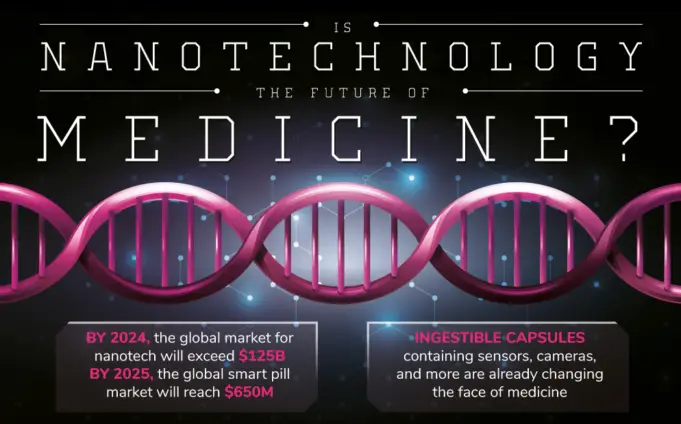Researchers are currently developing nanotechnology that will completely transmogrify the field of medicine: nanobots and smart pills.
By 2024, the global market for nanotechnology will exceed $125 billion; and by the following year, the global smart pill market will reach $650 million.
Using nanotechnology, researchers around the world are developing specialized nanobots capable of performing a wide range of surgeries on humans, while smart pills are being refined to ensure human digestibility as they include electronic sensors.
As expected, ethical concerns have broached when discussing the application of nanotechnology in medicine, leading there to be split opinions among the public regarding instrumentalizing the new science. Overall, nanotechnology is expected to revolutionize medicine, consumer goods, and industrial processes.
In Layman’s terms, reproducing an invention at a much smaller scale than it normally appears is nanotechnology. More specifically, the new technology is reproduced on the nanoscale, which is anywhere from 1 to 100 nanometers.
Nanotechnology itself is the initial study, then appliance, of extremely small things. The nanotechnology is then implemented within a wide-range of scientific subfields such as engineering, chemistry, and biology.
In medicine, and with specific regard to nanobots, nanotechnology will be used as a performer in a variety of Magnetic Micro Surgery (MMS): the act of using external, magnetic fields to direct a nanobot’s actions and movement throughout surgery to ensure and maintain accuracy.
The surgeries nanobots will perform include: eye surgeries, clearing blocked arteries, and collecting biopsies.
For instance; during eye surgeries, a nanobot will insert a tiny microneedle inside of a standard needle. Once the nanobot places the microneedle into the standard needle, a surgeon can then direct the guidance of the standard needle using a specialized magnetic field.
On the other hand, there are smart pills. In 2001, the PillCam became the first FDA approved smart pill, assisting in exploring unknown causes of bleeding in the small intestine.
PillCam is an ingestible capsule including a nano-sized camera, photographing the small intestine as it passes through the colon. Within 7 years by 2008, PillCams had been used in over 2 million procedures.
The array of smart pills is extensive; however, it is worth analyzing the purpose of dose tracking pills as this smart capsule hoists ethical concerns. Any dose tracking pill – regardless of its manufacturer – will contain a digestible sensor to log the patient’s internal findings.
Upon logging, the sensor will use its superfluity of connectivity technologies (i.e. Bluetooth, RFID) to transpond these records through a patch worn by the patient to the compatible mobile application.
The dose tracking pill’s mobile application will track the drug ingested, the dosage, and the time of ingestion, which can be shared with the administering doctor and others.
Collectively, non-adherence to medical treatment costs up to $290B in the United States alone. Knowing this, Smart Pills could be a major resource in improving drug adherence and patient outcomes.
While this stands, ethical concerns come as baggage with dose tracking pills.
The utilization of dose tracking pills increases the risk of patients feeling coerced into taking medications they are uncomfortable with, or pressured to share their private health data with doctors and caregivers.
Additionally, this could mentally harm patients with schizophrenia, increasing feelings of delusions and persecution.
Smart microscopes, nano patch vaccines, and smart bandages come into play as the matter unfolds. Carry on to the infographic below as it highlights the specifics of nanotechnology with greater insights.













